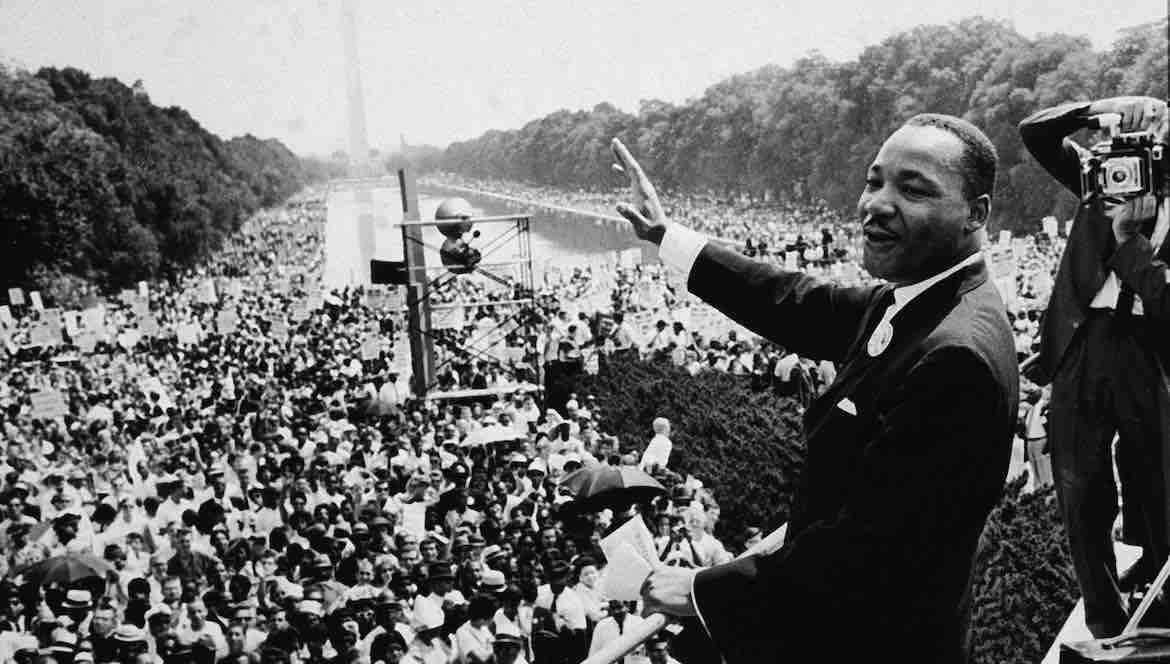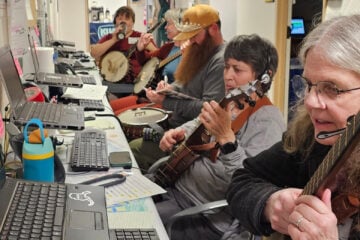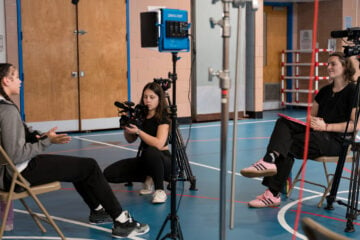‘Eyes on the Prize’ producer Henry Hampton reflects on how to serve ‘a nation immersed in turmoil’

CNP/Getty Images
Martin Luther King Jr. addresses participants in the March on Washington on Aug. 28, 1963.
With the return of Henry Hampton’s Eyes on the Prize series to the World Channel and PBS, the filmmaker’s keynote speech to the 1992 PBS Annual Meeting provides insights on his ideas for public broadcasting to “establish bridges of communication” across divides in American society.
At the time of Hampton’s speech, Eyes on the Prize had debuted to widespread acclaim as a definitive history of the civil rights movement from 1954–1985. Hampton had taken up other documentary projects. He had also undergone treatment for cancer.
Hampton reflected on the choices he had made in production of Eyes and urged his audience of public TV decision-makers to consider the roles they played in shaping civic discourse and restoring public trust.
Weeks before the meeting, civil unrest erupted in Los Angeles after a jury acquitted four police officers for use of excessive force in the brutal beating of Rodney King during a 1991 arrest. Hampton did not directly mention the Los Angeles Police Department or Rodney King in his remarks. But he warned of “more rebellions and disruptions in our cities” unless there was an intervention. His ideas for how public broadcasters could intervene are central to this speech from June 1992.
I have warm memories of the last time I addressed this body. It was in St. Louis, my home town, and I came to receive an award for Eyes I. The meeting was in the old Union Station building in downtown St. Louis — now a fancy hotel.
As I told people that evening, when I entered the building memories of the last time I had been there overwhelmed me.
St. Louis in the early ’50s was a segregated city. This was before public-accommodations laws and the civil rights movement, and no restaurants would serve blacks. But Fred Harvey’s restaurant in Union Station would, from time to time, open up and do so.
Thus one fine Sunday, Dr. Hampton, successful surgeon and general practitioner, determined to take his three youngsters out. My father was a proud and dignified man. I could see and feel him tighten as the ill-educated, clearly less-affluent waiter told us, “we can’t help you today.” That building held for me the terrible truth — that even an all-powerful father could not do some things.

I repeat this only because it is a strong memory, the kind of thing that families share. Here we are now in 1992, at a different point in my life and yours.
There are key moments in the history of organizations, nations, cities and individuals — moments that cannot be held for very long or duplicated, moments when we are given choices. We are at such a moment — being given difficult choices, but choices that we know will have an enormous impact on our futures.
I didn’t intend to make this so personal, but 16 months ago I sat on an examination table at the Dana Farber Cancer Institute and was given some choices. An innocent cough had turned into the devil incarnate. You are in no way prepared for such a moment: choices that can have irreversible and terrifying consequences. You try to be rational and controlled, but there is no time for comprehensive study. So you do what homework you can and then, in cowardice and courage, strike a bargain with yourself and go forward.
I did make the right choice, and both my doctors and I believe that I’m past it. And I would wager that right now there are many in this room who have faced such times and have survived.
‘We should charge ahead’
There is in Eyes on the Prize the story of two southern cities, Atlanta and Birmingham, vying for the title of “commercial center of the New South.” Ironically, Birmingham lost its chance while trying to reform itself from the evils of virulent racism. Before the city could act it gave its future to Bull Connor and his dogs, forever freezing the city as a barbaric opposer to human rights. Decisions, and consequences.
I do not think I need to belabor the fact that we as a system of broadcasters, producers and funders are at such a crossroads, and that we must decide collectively and individually which way to go. I have other things to say to you, but if you hear one thing, it is that I think we should charge ahead — a thoughtful charge based on instincts, our audience, our friends. But we must go ahead, or slide into a long, painful endgame that we cannot win.
Every producer and programmer here … knows that there is no other outlet for programs like The Civil War, Eyes on the Prize, Vietnam, Frontline and many others. And while we have done much great and good work, we know that our greatest challenges lie before us. For a nation immersed in turmoil, this is a time ripe with opportunities — if we can seize the day.
I want to offer a few notions with the apology that … I’m certain that some of my conclusions have been offered by others, more succinctly and more eloquently. But rarely is one given such a public chance to give his thoughts, so for what it’s worth, here are some of mine.
‘We need to rebuild trust’
Everyone here understands the media environment in which we operate. A generally declining audience has been fractionalized by the technology that provides programs to satisfy particular audience interests, from the networks, the Family Channel and ESPN to Discovery and Nickelodeon. But with all these choices, rarely is there a television program that can generate what I call “water-cooler interest” — material sufficiently engaging that it becomes the subject of immediate discussion and word-of-mouth promotion. Maybe The Civil War, maybe 60 Minutes, now and then Frontline. We should pursue such event programming.
The loyalty and trust that viewers once gave to television has largely disappeared. A cynical citizenry has come to treat media as an untrustworthy intruder, frustrating progress rather than leading us toward it. We need to rebuild trust with some and create trust with others we have long ignored.
Then there is what I would call “the outrage factor.” We have an audience so inundated by pictures of starving children and violent death that it can no longer react with indignation or horror. Two of the films that brought me into the business, Harvest of Shame and Titicut Follies, would have a hard time contending with A Current Affair or Oprah, and their impact would be so much less. But our future lies not in trying to duplicate, nor to over-sensationalize, but to innovate, to find ways to attract and keep audiences without succumbing and giving up certain standards.
But don’t misunderstand me. Competition for the viewer, and for a community’s trust and support, is a good and healthy process as long as we’re playing with a fair chance. By that I mean … adequate funding for production and promotion and a chance to pursue new concepts with enough support to give a new idea time to take hold.

I want to recommend that we focus on the notion of civility. It may sound naive and hopelessly idealistic, but the level of anger in much of our public discourse prevents effective communication. Talk radio, for all its success in giving voice to dispirited Americans, can also be blamed for loosing anger and mean-spiritedness around attempts at dialogue. We need to find ways to defuse anger and stress a few harmonies.
In some cases, this notion of civility can simply be in the choice of words. While we were producing Eyes on the Prize I, we had heated debates, but finally chose to call the southerners who opposed the civil rights movement “resisters” rather than “racists.” We did so because we wanted to keep this valuable history accessible and not lose viewers before we had engaged them in the story.
Eyes succeeded in part because of the power of its stories and its calm demeanor. This does not mean that we do not seek out passionate storytellers, journalists and performers, but we can remind all that sometimes lowering the volume works to the benefit of the message.
‘Getting ahead of our world’
We must work at getting ahead of our world rather than always reacting to it. We must establish a process by which we can anticipate what is to happen rather than always being forced to react.
As surely as I stand here, I know that, unless there is intervention, there will be more rebellions and disruptions in our cities. We can with foresight establish bridges of communication between and within urban and other communities, and when events do occur consider how we should react. South Africa this very day — after months of impressive progress in dismantling apartheid — is once again on the brink of violent disintegration.
We can take little comfort because we, as a nation, are on the edge of something dangerous. America could easily explode if the next rebellion or riot moves out from its inner-city location and cannot be readily contained. We must find ways to avoid such a catastrophe and reaction to it, because once we start down the road of an event followed by increasingly hostile reactions, we will quickly come to understand that this is not an America than can survive. We cannot build enough prisons or walls high enough to protect ourselves. If we try we only mortgage our souls for false freedom and a lost vision of democracy.
I think we should go to “school.” Some of you know that we have started our major series — Eyes, The Great Depression — with something called “school.” We bring in all kinds of presenters — academics, participants who lived through it, journalists — to meet over a week or more, spending 12 hours a day to immerse our production team —producers, editors, researchers, production assistants — in a subject. Then we are prepared, as best as we can be, to deal with the thousands of decisions, often under the gun, that we make in the preparation of work. All of us need such preparation about America’s future.
History is the ‘hard edge of memory’
I make a plea for more history. While not easy, we now know that it can have not only enormous entertainment potential, but it is also a powerful teacher. I have come to treasure these words from the Peruvian novelist and political leader Mario Vargan Llosa. He says that “memory is a snare, pure and simple. It alters, it subtly rearranges the past to fit the present. Memory is a snare.”
And indeed it is. But history — thoughtful and well-researched — is the hard edge of memory and arms us for our own lives. We can choose to accept words like “thugs” and “hoodlums” to explain Los Angeles, but we do so at great risk, for we ignore the history.
I have two quotations. The first is from a Nicholas Von Hoffman column. He quotes Gen. Thomas Gage, British forces’ commander in the North American colonies in 1765, 227 years before the Los Angeles explosion:
“The Boston mob, raised first by the instigation of many of the principal inhabitants, allured by plunder, rose shortly after of their own accord, attacked, robbed and destroyed several houses — among others, that of the lieutenant governor. … People then began to be terrified at the spirit they had raised, to perceive that popular fury was not to be guided, and each individual feared he might be the next victim to their rapacity. The same fears spread through the other provinces, and there has been much pain taken since to prevent insurrections of the people, as before to excite them.”
General Gage is not talking about minorities, but white Americans protesting an unjust tax.
History is the best compass we have. It is prologue for the future, and it is our obligation to preserve, retell and present it.
Diversity
PBS is still too white, too male. We must redouble our efforts to recruit, train and then give substantive opportunities to African Americans, Latinos, Asians, Native Americans and to others as producers and writers, creative and management talent. They will bring their own stories and passions that will, after experimentation, failures and second opportunities, succeed. … [B]ut there are too few experienced minority and women professionals ready to take on the challenging producing opportunities to come. Many will leave due to lack of access to serious jobs.
Multicultural history, well conceived and executed, is a rich mother lode of story and wisdom that has been largely unavailable. More often than not, it has to do with all of us.

Eyes on the Prize was about the American civil rights movement, but it was also very much about the expansion of American democracy. The Civil War was much more than a simple study of battles; it was a striking reminder of what racism and injustice can do to a nation.
Frederick Douglass, the powerful black abolitionist and crusader for women’s freedom, offered this wisdom to America:
“Those who profess to favor freedom, but deprecate agitation, are men who want crops without plowing ground, the rain without thunder and lightning, the ocean without the mighty roar of its waters. This may be a moral struggle or a physical one, but it is a struggle for power [that] concedes nothing without a demand. It never has; it never will. Find out just what a people will submit to and you will find the exact amount of injustice and wrong that will be visited upon them and that will continue until it is resisted with words, or blows, or both. For the limits of tyrants are proscribed by the endurance of those who they oppress.”
A nation that understands and values Douglass is a nation better prepared for its own time.
And who are we?
The other day The New York Times carried a satellite photo of 1,000 square miles of forest in the Pacific Northwest. Next to it was a similar shot taken of an Amazonian rain forest. The rain forest, though it had some substantial swathes cut out of it, still looked reasonably intact. But the forest in western Oregon was unrecognizable as a forest. It was a crazy quilt of clear-cut patches separated by thin ribbons of trees. From the ground you couldn’t see this; the loggers had left just enough trees to hide massive and probably irrecoverable devastation.
As producers and filmmakers, we’ve come to respect the power of perspective. Angles and distance change perceptions. Things are seldom what they seem. Rarely is there point of view. There are many ways to tell a story, and just as many ways to see it, hear it, understand it.
What drives most of us in this room is not ideology. What drives us is the search for ways to capture and record, to portray and dramatize, the reality of our experience — to look for ways to understand the world and our place in it, to learn from this process, and even to be entertained and, perhaps, uplifted by it.
We contribute by trying to make sense out of the personal world within ourselves and the public world outside. If we fail, we may still leave a trail for others to follow. The important thing is to continue with the search.
For all its other facets, public broadcasting, at its core, is a place where the seekers can ply their crafts and, in so doing, help us begin to piece together a new vision and a sense of the national, global and local villages. But you must know that seekers are not always treated well and sometimes punished if the message angers others.
Just two final thoughts. We must help rebuild the public trust. By that I mean the faith that most Americans have always had in their future and their ability to share in the American dream.
That trust is now in jeopardy, and it jeopardizes us all. People without hope are dangerous people, and we must renew our commitment to see that all have opportunity and access. Many will be surprised that out of a sustained assault on poverty and racism we will free the nation and truly make it the powerful, humane, prosperous country that we all can share.
The writer Federico de Roberto said that “among all human constructions, the only ones that withstand the dissolving hands of time are the castles in the air.”
Those castles are the dreams that drive us forward, the dreams that give us courage to meet the challenges of a time such as this. Most of us understand the diagnosis of what ails our nation; the issue now is to chart a course and a vision. For shared dreams are at the very core of rebuilding public trust.
Graham Greene says that “there is a moment in childhood when life opens up and lets the future in.” For us, this may be such a moment. The choices that are to come will take all our courage and wisdom, humanity and discipline, to survive. But we will survive.
Years in the future, when photos of this room are discovered in some buried PBS file, someone might ask, “who were these people?” And someone who knows might offer that “these were the public teachers, educators, agitators for justice, the programmers, the poets, the philosophers, the tellers of science, and leaders who were helping to build a new America.”
Henry Hampton created and produced Eyes on the Prize and several major documentary series for PBS through Blackside Inc., an independent production company. His works for public television include The Great Depression, Malcolm X: Make it Plain, America’s War on Poverty and BreakThrough: The Changing Face of Science in America. Hampton died in 1998.






